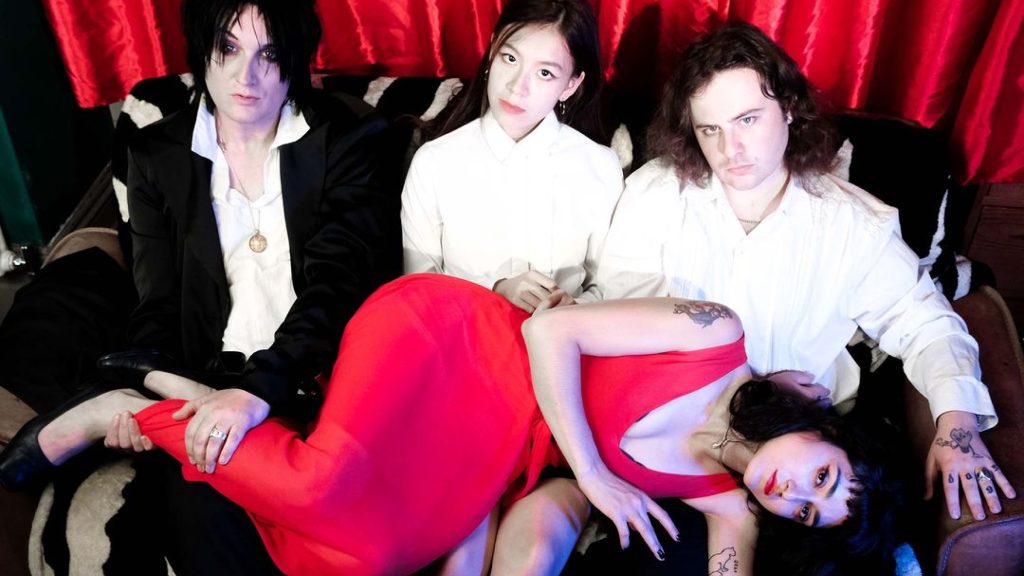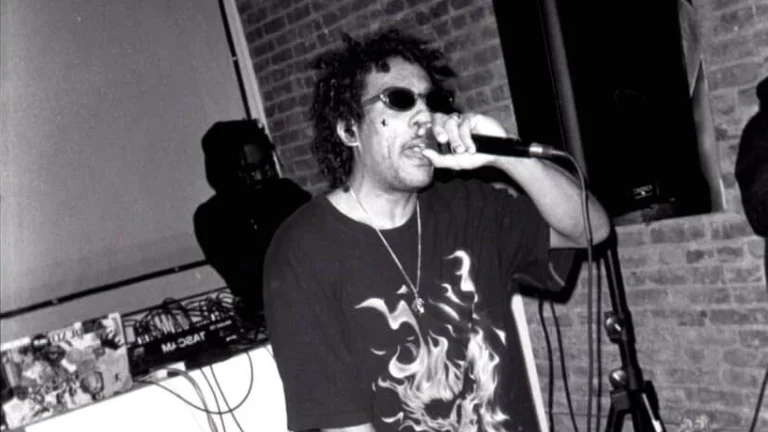In Tibetan Buddhism, the Bardo is the intermediate state of existence between death and rebirth; a liminal space where consciousness is freed from its physical body, suspended between past and future. London-based alt-experimental band Black Bordello guides you through a twisted tour of this realm in their sophomore album White Bardo, an electrifying mix of thought-provoking lyricism and horror film-esque instrumentals across its nine sinister yet serene songs.
The title track “White Bardo” plunges listeners into haunting sonic territory as a deep male voice narrates the cathartic experience of wandering the Bardo. Ominous spoken word meshes with hypnotic strings alongside intermittent wails that are both alarming and alluring, describing a physical and spiritual shift from the “dark and foreboding sky” and “faces twisted in agony and despair” towards feelings of “peace and acceptance” before an eventual surrendering to bright white light. It’s a compelling opening to the album that grips you firmly by the shoulders, leading you through the dark, dramatic, and delightfully unpredictable soundscape that unfolds.
Storytelling is rich and graphic across White Bardo, with “The Garden of Earthly Delights” exploring the body/mind dichotomy through striking lyrics set against decidedly unearthly instrumentals. “See me / Entangled and dirty / Hanging up by my feet / Upside down in the tree,” lead singer Sienna Bordello croons as ghostly murmurs drift through a backdrop of chilling electric guitar from Jerome Alexandre and a swaggering beat; it’s as though a church choir rehearsal has been interrupted by an experimentalist avant-pop concert. Black Bordello plays with genres as confidently and thoughtfully as they toy with traditional conceptions of death: “I will never ever die / I’m detonating the circle of time”, Bordello assures listeners—and herself—as she emphasizes the continuation of the spirit after the body decays, finding comfort in the inevitable physical ephemerality of humankind.
Chasing more answers, “Love is a Joke” strips romance back to its rawest form: something addictive, possessive, divine. At first, Bordello’s voice is light and airy, almost childlike, as she wistfully recalls the exclusivity of love: “Love is a joke that I wasn’t told at nine years old.” Weaving lush psychedelic tones with layers of gentle vocals, the final verse is perhaps the most evocative of all, reading almost like a poem:
The clouds have cloaked us
Acid rain burns
We shower together
In chasmal beauty
As we say the words
We meet here in Heaven
Merging the earthly with the heavenly, Bordello depicts love at its most primal and awe-inspiring, destructive yet devout; the subjects of the song lie together, nestled deep in the crux of the Earth, consumed by the elements as they surrender to the afterlife. Such vivid lyricism is paired with equally enchanting instrumentals, incorporating dazzling guitar alongside Rachel Asafo-Agyei’s ethereal backing vocals.
Transporting us to one of South London’s historical cemeteries of the same name, “Nunhead” opens with a relaxed drum beat from percussionist Eddie Amos as Bordello’s bright vocals describe her anticipation towards death and current disillusionment: “I’m running but I’m going nowhere / And all my dreams have turned to nightmares.” This lyrical dissonance is strikingly sharp—as jaunty drums and Alexandre’s infectious guitar rhythms mask an underlying darkness, Bordello fully embraces these feelings of frustration with head-on stubbornness. As the track spirals, she condemns the gentrification of South London with scathing wit. “Crack the yuppie heads and fill them with the seed / Ain’t sunny Peckham a jolly place to be?” she taunts before “Nunhead” descends into a rousing finale; crashing drums give way to Anthony Boatright’s fiery bass-led outro, leaving listeners with a lingering sense of defiance.
After such intense emotional buildup, “Smoke and Hiss” begins as a refreshingly understated end to the album—it’s reminiscent of the type of song that plays to signal the end of a raucous party as guests disperse and the lights come on. “I miss your love / it lingers like a drone / I don’t wanna be alone,” Bordello admits as the track opens; her voice is soft against more tender guitar strums and a slow, steady bassline. However, Black Bordello keeps us on our toes until the bitter end: the track contorts into a spectacle of warped theatricality with dark jazz undertones, before twisting again, this time into a more muted soundscape of simple guitar plucks against piercing flute melodies. Ending with the same easy-going sounds it started with, “Smoke and Hiss” serves as a triumphantly bold finale to the album, capturing Black Bordello in all their creative, experimental glory.
At its core, White Bardo is both frightening and freeing, grappling with vast themes of mortality and modernity without being tied down by genre as sounds ebb and flow between the angelic chancel of a church, the sweaty pit of a post-punk gig, and the decadent drama of the theatre. The Bardo becomes a place of catharsis and liberation, something to be embraced rather than feared, as Black Bordello assert themselves as a brilliantly original band on London’s ever-crowded music scene, ready to push boundaries again and again as they break into new spiritual dimensions.





